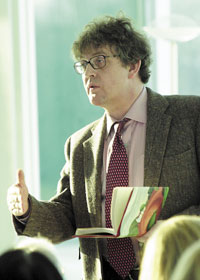|
This is an archived article.
For the latest news, go to the Advance Homepage
For more archives, go to the Advance Archive/Search Page. |
||
|
Poetry Makes Sense Of Key Moments In Life
Paul Muldoon, born in Ireland and now living in New York City, is the speaker in this year's Elizabeth Shanley Gerson Memorial Irish Literature program, set for Feb. 10. Q. Why isn't poetry more popular?
A. Well, it's certainly true that, comparatively speaking, poetry is not such a popular activity. But, then again, it never has been. But, I think for the most part, poetry is something that we've tended not to be educated in. That's really the problem. Poetry is the last thing that is taught in most public school curricula. Part of this is due to the fears of many English teachers. They fear that they don't understand it and are always slightly nervous about it. It's much harder to talk about what is happening in a poem and often it is easier to discuss it in simplistic terms. Indeed, young people have often been put off because of the difficulty insisted upon by teachers. Q. Why does one have to "learn" to read poetry, when people can enjoy novels or movies or certain forms of music without having to learn how to do it? A. We do have to 'learn' to read novels. We are just not so conscious of having learned to do it precisely because we have done it so often. We are not so conscious of our response to pop music because we've done it all our lives. So, we don't realize that we have learned to listen to pop music. And yet, some how we expect to go into poetry from a standing start and get into it. Q. Is poetry important to the normal everyday person? A. If realized, poetry does help us make sense of the key moments in our lives. People realize that when a major moment occurs, a birth, a death, a marriage, they realize that poetry might have something to say to that moment. They know that poetry might be a way of making sense of what is happening. They just have no idea of what to reach for. This is one of the reasons why it's very important for poets to go into schools. It's important for students to see that poets are ordinary people. Q. Can anyone be a poet? I think so. Otherwise, we as teachers and professors would be frauds. Anyone can be a poet in the same way that anyone can be a guitarist. I would like to think that I would be able to do it if I put some time into it. Whether or not I'd ever become Jimmy Hendrix is another matter. You need a sort of aptitude to be good at anything. But, yes, absolutely, everyone has a poem in them. Q. Would you encourage a student to be a poet? A. Why not? We've plenty of folks in other fields. It's no harder than being a janitor. Q. Does writing ever generate fears in you? A. All the time. Yes. Without fears and doubts, no one ever arrives at the condition of being a writer. So much about writing is about giving oneself over to it. The language and poem uses you. Most students and readers do not think of it that way. They think of themselves as being in command. That sense of humility is the most difficult thing to teach. The truth is that rarely are we in command of anything. This is not to say that people have no will power or input. But people take command at moments when history makes them take command. Q. You've written operas, produced for the BBC. Why isn't poetry enough? A. One can't do it all the time. It's much too concentrated, much too hard. I guess you could say that less is more, if you want to do something that is of a particular standard. Otherwise, it becomes not too grand. One can fake it, I suppose, but then everyone would know it, even if you didn't realize it at the time. Q. It often seems as if background stories about writers, poets, and other artists include a long period in which the artist suffered. Do you have to suffer to be good creatively? A. I hope not. |

